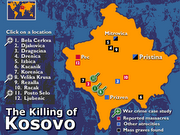By Judy Dempsey IHT
Friday, June 8, 2007
HEILIGENDAMM, Germany: Leaders of the Group of 8 leading industrial countries failed Friday to agree on the future status of Kosovo after Russia rejected a proposal unexpectedly presented by President Nicolas Sarkozy of France.
Sarkozy, attending his first G-8 summit meeting since becoming president last month, surprised Chancellor Angela Merkel of Germany and the leaders of Britain, Canada, Italy, Russia, Japan and the United States when he called for a delay in granting Kosovo independence from Serbia.
Diplomats said Sarkozy had not informed Javier Solana, the European Union foreign policy chief, about his plan, even though the EU will play the major role in supervising Kosovo's independence.
Speaking at the end of the three-day meeting, where she had won wide admiration for her skillful diplomacy, Merkel had to concede that there were "still differences of opinion" after diplomats spent hours trying to reach a compromise on Kosovo. "Time is pressing. We have to find a solution. We would like to reach a consensus," Merkel said.
Sarkozy proposed that a new United Nations Security Council resolution aimed at paving the way for the province's independence be delayed for six months to allow fresh negotiations between Serbia and Kosovo. If no deal agreement emerged, the UN plan would be applied, he said.
"For the time being, the necessary progress has not been made," Sarkozy said Friday after talks with President George W. Bush.
Apart from Merkel, the other G-8 leaders did not comment on Sarkozy's plan. But diplomats said there was some skepticism, particularly from the United States, over any delay. Merkel said senior diplomats involved in the UN plan for Kosovo would meet next week.
The province has been under a UN protectorate since 1999, when NATO bombed Serbia to stop the killings of the ethnic Albanians who make up more than 90 percent of the province's two million inhabitants.
A plan presented last January by Martti Ahtisaari, the UN special envoy, authorizes EU supervision of Kosovo for at least two years during the transition to independence. In the meantime, the EU would establish strong institutions to protect the small Serb community in the province.
Russia, a member of the Security Council, has repeatedly opposed granting the province independence and has threatened to veto any resolution unless Serbia and Kosovo resume negotiations over the future of the province. Sarkozy said he feared a division in the Security Council would divide the international community and risk the lives of NATO forces who have been in the province since 1999.
Putin said later at a news conference that there had been no change in Russia's position.
"The issue was respecting the territorial integrity of Serbia," he said. And, in a warning to other UN Security Council members about rushing into granting the province independence, he said it could be a precedent for other independence movements, such as Ossetia and Abkhazia in Georgia.
Serbia's leadership rejected the Ahtisaari plan, but the ethnic Albanians have overwhelming accepted it. All political parties in the province agreed to forego violence to push their claims for independence after pledges by the United States that it could propose a new Security Council resolution that would end Kosovo's protectorate and allow the province to move toward independence.
EU diplomats Friday said they feared that any delays could trigger new violence.
The Kosovo prime minister, Agim Ceku, appealed to the UN Security Council members to "adopt a resolution as soon as possible or to let us take our own path."
"We can't wait anymore. Every day of delay means an increase in frustration and a loss of legitimacy," said Ceku, who has warned that Kosovo would declare independence unilaterally if thwarted by Russia.
President Fatmir Sejdiu called on Western governments to reaffirm their support to Ahtisaari plan
"It is important to for us to continue the dynamic in the Security Council to approve a new resolution," Sejdiu said in Pristina.
The European Union, meanwhile, has been making elaborate preparations to supervise the province's independence by sending hundreds of police officers and judicial experts to establish the rule of law and strong judicial institutions.
Nicholas Wood contributed reporting from Pristina.
Subscribe to:
Post Comments (Atom)


No comments:
Post a Comment